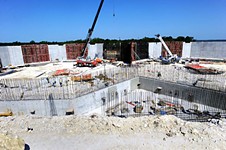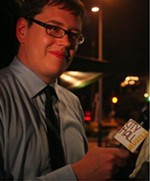To Bond, or Not to Bond?
Bonds dominate the immediate City Council horizon
By Wells Dunbar, Fri., Jan. 13, 2006
Cut, in the end, were last-minute proposals for dealing with the package's late-gestation problem child – State Highway 130, the 49-mile tollway development east of the city, expected to drive much regional growth in the next decade. Highway-related projects had not been on the committee's radar until Mayor Wynn sounded a sudden alarm for that effort – without suggesting that the $600 million overall target should be expanded. With the proposal due at council this month, the committee was abruptly faced with a late-inning substitution.
"I'm kinda out of line in this," said David Sullivan, veteran of 1998's bond process, "trying to introduce this in this late stage. But I'm duty-bound to make this recommendation." Sullivan's apologetic suggestion, which came during last week's final meeting of the public outreach subcommittee, was to ask the council to shovel an additional $200 million in general revenue bonds (repaid from city operating funds) on top of the committee's $614.8 million in general obligation bonds (repaid from property taxes) for dealing with SH 130. Calling the $200 million figure simply a placeholder, Sullivan backed away from the number, instead contemplating language instructing the city manager simply to examine the possibility of revenue bonding. But that alternative was also abandoned, when Sullivan learned the city has "moved away" from revenue bonding. Still, the proposals illustrated the committee's unease in trying to balance its charge of providing for 130 without any additional funds for the purpose – especially after everything else in the package has already been spoken for, many times over.
The initial City Council resolution calling for the bond election says it should be designed in "common to those goals identified by Envision Central Texas," the umbrella organization assembled to guide regional development. But the BEAC began work before the conclusion of the SH 130 planning process, so even ECT's stalwart supporters have been frustrated. Committee Member Robin Rather is on ECT's board of directors and executive committee, yet at the final BEAC discussion, she said the bond committee has received "no specific plan … no backup" on 130. With 130's specific needs so nebulous – and other projects made concrete by hundreds of speakers – in its final days the committee scrambled for ways to preserve the overall package while providing wiggle room for 130. An outline of the final report says as much, noting that while SH 130 investment is needed, "the lack of detailed proposals to date, and the resulting lack of vetting/consideration by the community, highlights the amount of work still needing to be done to bring any such package to fruition."
What's to blame for the discordant climax? Probably the conflict between the council's lofty planning goals and the pragmatic nuts and bolts requested by city staff. Despite the mayor's request that the bond proposal be informed by ECT goals, the committee's explicit template began with City Manager Toby Futrell's "needs assessment" – very heavy on city infrastructure, light on 130 recommendations, and knee-deep in workaday items of uncertain import to a bond election, like HVAC repairs and roof replacements for ailing buildings – undertakings normally paid for directly out of the city's general revenue. And when public hearings commenced, the committee wasn't exactly overwhelmed by 130 boosters; of the hundreds of speakers, there was a sole mayoral echo on behalf of 130 – a spokesman from the Chamber of Commerce, who grudgingly acknowledged that he had no specific projects to recommend.
That's not to say the committee will recommend nothing concerning 130. According to Sullivan, funds for creek protection, affordable housing, and $20 million of the open space recommendation apply to SH 130 neighborhoods. However, all of the $66 million allocated directly to roads will fund reconstruction, and none applies to 130-related roads (e.g., expanding MLK eastward). Sullivan said he has "some trepidation" that when the council looks for funds for 130, it will be other road projects feeling the axe. Alternate forms of SH 130 financing might be considered – perhaps tax increment financing, under an amendment to 1997's SB 370, from Austin Sen. Gonzalo Barrientos ("The language essentially points at SH 130," said Barrientos aide Graham Keever). The funds will have to come from somewhere – else – if the bulk of the committee's recommendations are to survive at council, which is scheduled to take them up Jan. 26.
Proposed COA Bond Package
Facilities $144.0 millionDrainage 122.1 million
Transportation 98.9 million
Open Space 92.3 million
New Central Library 90.0 million
Affordable Housing 67.5 million
Total $614.8 million
Got something to say on the subject? Send a letter to the editor.










